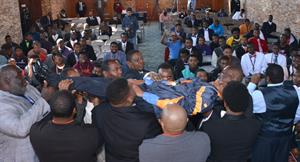‘I’m Possible’: Black Males Learn What It Takes to Become Great at Claflin University Symposium
Feb 28, 2014
 “Mr. I’m Possible” Keith Brown was at Claflin University on Friday to share his vision for becoming a successful black man in today’s society at the fourth annual Black Male Symposium.
“Mr. I’m Possible” Keith Brown was at Claflin University on Friday to share his vision for becoming a successful black man in today’s society at the fourth annual Black Male Symposium.
Through his lively personality and upbeat presentation – complete with cheers and chants and many shared laughs – Brown kept the audience engaged as he shared his testimony of rising from being labeled a special needs student to becoming a well-known entertainer and speaker, delivering a powerful message to everyone in attendance.
“I have come to the conclusion that in this country, black males … are God’s children and America’s orphans,” he said. “The color of your skin is a universal stain.
“But you, young black males, have an opportunity to save us.”
That starts with knowledge, Brown said, adding that it’s time to put down all of the devices that distract and start filling the mind.
“Heads up, pants up, grades up,” he continued. “The company you keep will determine the levels you reach.
“You will never be great until you stop looking at your life through other people’s eyes. Never let anyone’s negative opinion of you be the way you think of yourself.”
Don’t just want to be somebody or something – BE somebody or something, Brown encouraged.
“You have got to understand there is purpose for your life,” he said. “You were born to be great. You don’t have to be great to get started, but you have to get started to be great.”
Earlier in the day, the students from area colleges and high schools, joined by educators, mentors and law enforcement personnel, held panel discussions centered on the theme of this year’s symposium, “Black Male Achievement: Strategies and Techniques in Service Delivery to African-American Males.”
Antarius Goodwin, a junior at Lake Marion High School in Santee, said comments from the presenters stuck with him – particularly a nugget about reflecting on one’s life. Another presenter “made me think about the music that I listen to, and he’s right – it does kind of have a self-destructive message,” Goodwin said.
“What’s missing in a lot of our schools is character education,” said Dr. Johnny Hill, interim chair of Claflin University’s Department of Philosophy and Religion. “We’re not training our young people how to think – we are training them to get a job.”
South Carolina State University Department of Education chair Dr. Evelyn Fields, who also serves as an early childhood education professor, said many of her students focus on character development for the very young students they will teach “because that’s a part of human development.”
She said it’s very important that young children and youth learn resilience and ethics in their early lives because “what purpose is there having a job if you can’t function, if you can’t get along and work with other people?”
Dr. Omari L. Dyson, an assistant professor in S.C. State’s Department of Education, said, “Your education has to be linked to your community. We have to teach our children what it means to be responsible and accountable.”
There will come times, Hill said, when individuals will be required to conform to the world in which they live. Other times, however, they must be strong enough to break away from the crowd.
“Many African-American males don’t know who they are,” he said. “What we need is a more rigorous, robust conversation in various sectors of our society. What does it mean to be black? What does it mean to be an African-American male?”
Fields said you can’t expect to affect someone else’s life if you don’t even know who you are.
“Another part of that is courage – the courage to be different. You may set a great example for other people who are struggling to find the courage,” she said. “In some situations, it may be necessary to assimilate. But that does not mean to change who we are.”
Dyson said while the dwindling graduation rates and staggering incarceration rates of black males are frightening, young black males shouldn’t be afraid to work to overcome the obstacles that present themselves.
“It’s about defining yourself, knowing who you are,” he said. “You know the statistics – and now you know what you need to do.”
Ronald Brown, a special education teacher at Edisto High School in Cordova and advisor to the school’s Young Men II Men group, brought 10 students with him to gain some insight at the symposium.
“This is a good environment for young black men to come together … and see older black males coming from where they come from and achieving what they’re achieving,” he said. “Here, they can see positive black males doing positive things, and that education does make a difference.”
Edisto senior Byron Rouse said he realizes that he’s still learning who he is.
“And that I need to participate in my community, and take the education I get back into my community,” he said.
Sophomore Malvin Harmon said he knows not every black male is going to make it as an NBA player or rapper.
“The statistics really stick out, and a lot of us aren’t making it,” he said. “I want to grow up and make more of myself – to be something in life and not a statistic.”
That’s something that Edisto junior Lawrence Hickson said can be achieved through education.
“Education is a platform,” he said. “If you really focus, you can conquer anything in the world.”